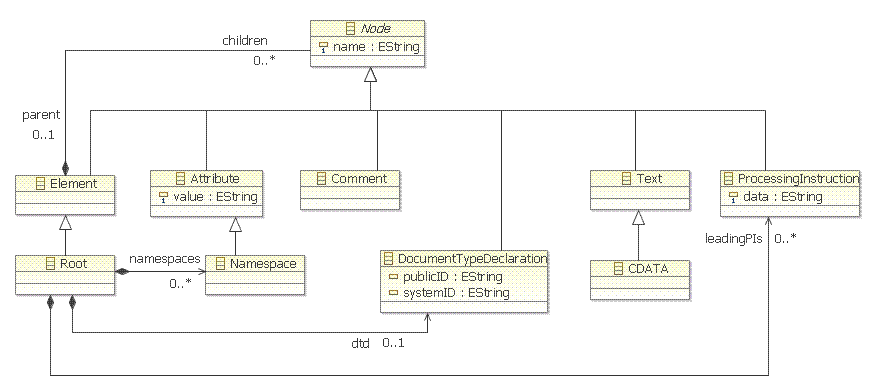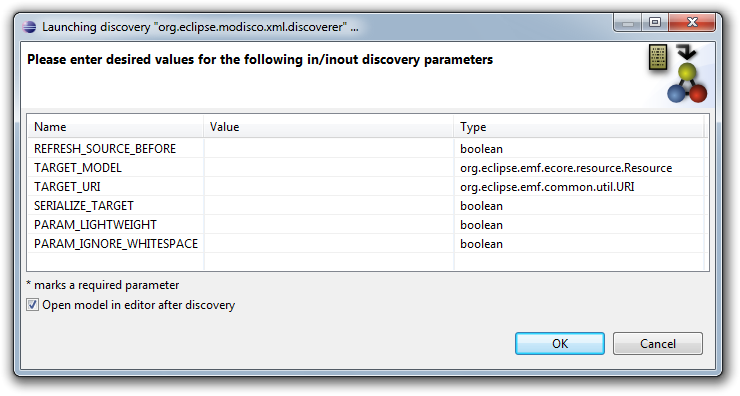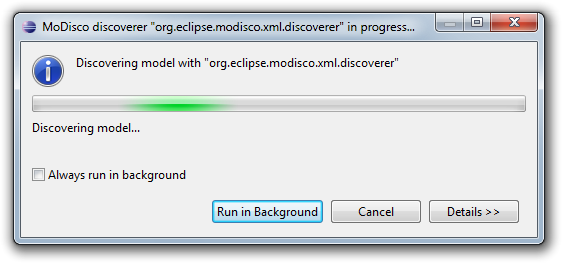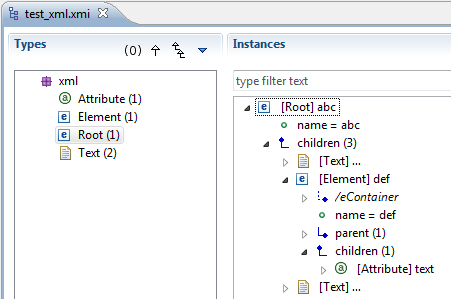Notice: this Wiki will be going read only early in 2024 and edits will no longer be possible. Please see: https://gitlab.eclipse.org/eclipsefdn/helpdesk/-/wikis/Wiki-shutdown-plan for the plan.
Difference between revisions of "MoDisco/Components/XML/Documentation/0.9"
(→Install) |
|||
| Line 10: | Line 10: | ||
Concepts for Document Types Declarations are not managed here. | Concepts for Document Types Declarations are not managed here. | ||
Note : there is no composite 'ownedAttribute' reference between Element and Attribute type to avoid ambiguous duplicate owning possibilities considering 'chidren' reference. | Note : there is no composite 'ownedAttribute' reference between Element and Attribute type to avoid ambiguous duplicate owning possibilities considering 'chidren' reference. | ||
| − | |||
| − | |||
| − | |||
| − | |||
| − | |||
| − | |||
| − | |||
| − | |||
| − | |||
| − | |||
| − | |||
| − | |||
| − | |||
| − | |||
| − | |||
| − | |||
| − | |||
== XML Discoverer == | == XML Discoverer == | ||
| Line 40: | Line 23: | ||
Since the metamodel is a subset of W3C XML concepts, the end user should be aware of some limitations in serializing back some advanced XML contents. | Since the metamodel is a subset of W3C XML concepts, the end user should be aware of some limitations in serializing back some advanced XML contents. | ||
| − | |||
| − | |||
| − | |||
| − | |||
| − | |||
| − | |||
| − | |||
| − | |||
| − | |||
=== User manual === | === User manual === | ||
| Line 111: | Line 85: | ||
For more details see the java documentation on the XMLModelDiscoverer class. | For more details see the java documentation on the XMLModelDiscoverer class. | ||
| − | + | == Install == | |
| + | |||
| + | You can [[MoDisco/Installation|install]] the XML discoverer and associated metamodel from the MoDisco update site. | ||
| + | |||
| + | == Source Repository == | ||
| − | + | All of the source code is stored in the Eclipse public source repository: | |
| − | * | + | * XML metamodel : https://dev.eclipse.org/svnroot/modeling/org.eclipse.mdt.modisco/plugins/trunk/org.eclipse.gmt.modisco.xml/ |
| − | + | * XML discoverer : https://dev.eclipse.org/svnroot/modeling/org.eclipse.mdt.modisco/plugins/trunk/org.eclipse.modisco.xml.discoverer/ | |
| − | |||
| − | |||
| − | |||
| − | |||
{{MoDisco}} | {{MoDisco}} | ||
[[Category:MoDisco]] | [[Category:MoDisco]] | ||
Revision as of 08:06, 29 March 2011
| MoDisco |
| Website |
| Download |
| Community |
| Mailing List • Forums |
| Bugzilla |
| Open |
| Help Wanted |
| Bug Day |
| Contribute |
| Browse Source • Project Set File |
Contents
XML Metamodel
Definition
Concepts are described in W3C XML Recommendation (document and logical structures sections). Concepts for Document Types Declarations are not managed here. Note : there is no composite 'ownedAttribute' reference between Element and Attribute type to avoid ambiguous duplicate owning possibilities considering 'chidren' reference.
XML Discoverer
The goal of the Generic XML Discoverer plug-in is to allow generic extractions of XML information from a XML file, without the need for a metamodel dedicated to a conforming Document Type Definition(DTD) or XML Schema Description (XSD).
Details
Considering XML files conforming to DTD or XSD, it will be more convenient to have some dedicated metamodels to manipulate information. However, Generic XML Discoverer is an alternative for miscellaneous XML files (no or uncommon DTD/XSD).
This plug-in aims at analyzing any XML file providing a model describing the information found, conforming to the Generic XML metamodel. Moreover, it allows to serialize the xml file back from the model. Thus, some M2M transformations might be used jointly to upgrade some xml files.
Since the metamodel is a subset of W3C XML concepts, the end user should be aware of some limitations in serializing back some advanced XML contents.
User manual
Right-click on a XML file and select the XML discoverer (Discovery > Discoverers > Discover XML Model...):
A discovery parameters dialog opens to let you specify the parameters of the discovery:
- Set SERIALIZE_TARGET to true if you want to save the model to a file
- You can define TARGET_URI to the location of a file in your workspace. If it is not defined and SERIALIZE_TARGET is true, a model file with a default name will be created in the project.
Beware: the file will be overwritten if it already exists!
Once launched, a progress dialog will appear as soon as the operation begins. Depending on the size of your file, the reverse engineering process might take some time to complete:
At the end of the process, the newly created model file is added to the root of your project if you set SERIALIZE_TARGET to true:
And the model is opened in the default model browser if you selected Open model in editor after discovery:
The model file for the XML file (with a filename ending in "_xml.xmi" by convention) can be opened in any model browser:
Discoverer API
First, add the following plug-in dependencies to your project (Require-Bundle in your Manifest.MF):
- org.eclipse.modisco.infra.discovery.core
- org.eclipse.gmt.modisco.xml
- org.eclipse.modisco.xml.discoverer
You can launch the discovery of a XML model from a file programmatically, and get the resulting model:
XMLModelDiscoverer discoverer = new XMLModelDiscoverer(); // you can set some parameters discoverer.setIgnoreWhitespace(true); discoverer.setLightweightModel(false); // launch the discovery discoverer.discoverElement(xmlFile, monitor); // get the resulting resource containing the XML model Resource xmlResource = discoverer.getTargetModel();
To have a monitor to pass to the discoverElement method, you can either call the discoverer in an Eclipse Job, or pass a new NullProgressMonitor if you don't need progress reporting.
Some options can be set for the discovery operation :
- IGNORE_WHITESPACE : ignore white space in text portions
- LIGHTWEIGHT : to minimize the memory size of the obtained model. If set to true : comments are ignored, text portions with only spaces and line delimiters are ignored.
The XML content can be serialized back since the model elements are contained in a dedicated org.eclipse.emf.ecore.resource.Resource implementation.
For more details see the java documentation on the XMLModelDiscoverer class.
Install
You can install the XML discoverer and associated metamodel from the MoDisco update site.
Source Repository
All of the source code is stored in the Eclipse public source repository:
- XML metamodel : https://dev.eclipse.org/svnroot/modeling/org.eclipse.mdt.modisco/plugins/trunk/org.eclipse.gmt.modisco.xml/
- XML discoverer : https://dev.eclipse.org/svnroot/modeling/org.eclipse.mdt.modisco/plugins/trunk/org.eclipse.modisco.xml.discoverer/
| MoDisco | |
| Components | Infrastructure: KDM · SMM · GASTM · Model Browser · Discovery Manager · MoDisco Workflow · Query Manager · Facet Manager · Metrics Visualization Builder · KDM Source Extension Technologies: Java · JEE · EjbJar · WebApp · XML Use Cases: Simple Transformation Chain · Model Filter |
| Help | Installation · SVN |
| Project | API Policy · Retention Policy · Project Plan · metrics · Accessibility Guidelines · Capabilities Disablement |







